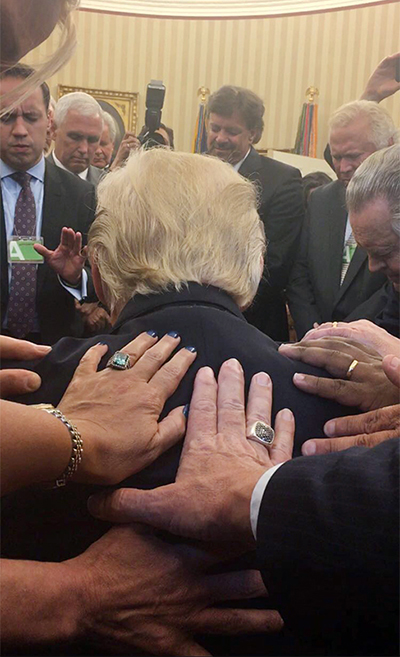Baylor survey: Trump supporters fear Islam and Middle East refugees
NASHVILLE, Tenn. (RNS)—Americans who voted for President Trump often are very religious, believe in an authoritative God and hold traditional views about gender, Baylor University research shows.
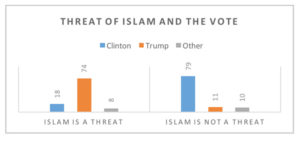 A new Baylor Religion Survey also found Trump supporters are more likely than other voters to see Muslims as threats to America and to view the nation as a Christian one.
A new Baylor Religion Survey also found Trump supporters are more likely than other voters to see Muslims as threats to America and to view the nation as a Christian one.
Almost three-quarters of Trump voters said Islam is a threat, compared with 18 percent of those who voted for Hillary Clinton. An even higher percentage—81 percent—of Trump voters strongly agreed Middle East refugees are a terror threat, compared with 12 percent of Clinton voters.
“Today, divisions in the American public are stark,” said Paul Froese, a Baylor University sociology professor and director of Baylor Religion Surveys. “We can trace many of our deep differences to how people understand traditional morality, theology and the purpose of our nation.”
Baylor released the survey results Sept. 7 at the annual meeting of the Religion News Association in Nashville, Tenn.
‘Trumpism’ as new nationalism
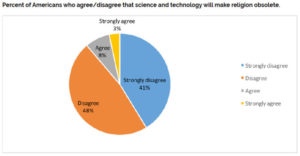 The authors of the survey describe “Trumpism” as “a new form of nationalism which merges pro-Christian rhetoric with anti-Islam, anti-feminist, anti-globalist and anti-government attitudes.”
The authors of the survey describe “Trumpism” as “a new form of nationalism which merges pro-Christian rhetoric with anti-Islam, anti-feminist, anti-globalist and anti-government attitudes.”
Researchers found six in 10 white evangelical Protestants voted for Trump. Their figure is lower than others—who have found 81 percent of white evangelicals voted for the president. The Baylor calculations are based on the church attended by a respondent, as opposed to other studies in which respondents self-identified as evangelical.
Most Americans who viewed themselves as “very religious” voted for Trump while most who said they were “not religious” or “not spiritual” voted for Clinton. But almost the same percentage of those who viewed themselves as “very spiritual” voted for Trump (46 percent) or Clinton (45 percent).
Some people view people of other faiths as threatening, with evangelicals viewing Muslims as the biggest threat and black Protestants viewing atheists as posing the most danger.
More than a third of respondents (35 percent) said Muslims want to limit Americans’ freedoms, but a similar percentage (36 percent) said conservative Christians have that desire. About half of evangelicals think Muslims and atheists want to restrict freedoms. Two-thirds of people with no religious beliefs worry that conservative Christians want to limit freedoms.
Believe in an authoritative God
The survey analysis indicates people’s varying perceptions about what God is like predict much about their political attitudes, moral behaviors and global view.
 Four perceptions are an authoritative God who is very involved with humanity and very judgmental; a benevolent God who is highly engaged but not judgmental; a critical God who is not engaged but highly judgmental; and a distant God who is not engaged and not judgmental. A fifth perception is atheism, defined as a lack of belief or a strong disbelief in the existence of a god or any gods.
Four perceptions are an authoritative God who is very involved with humanity and very judgmental; a benevolent God who is highly engaged but not judgmental; a critical God who is not engaged but highly judgmental; and a distant God who is not engaged and not judgmental. A fifth perception is atheism, defined as a lack of belief or a strong disbelief in the existence of a god or any gods.
Belief in an authoritative God is one of the sacred values of Trumpism, researchers concluded.
The survey, titled “American Values, Mental Health, and Using Technology in the Age of Trump,” also looked beyond politics. On the topic of mental health, researchers found that those who feel “life has no purpose” are the most depressed, even more than those who fear hell the most.
The newest survey from Baylor University is the fifth in a series that dates to 2005. Its findings are based on a random sample of 1,501 adults and was administered by the Gallup Organization in the spring of this year during the first months of the Trump administration. The study has a margin of error of plus or minus 3 percentage points.
Other findings about Americans include:
- 89 percent disagree that science and technology will make religion obsolete.
- 38 percent of people with no religious tradition said they feel addicted to technological devices; 18 percent each of evangelicals and black Protestants said they feel addicted to them.
- 77 percent never use the Internet to share their religious views.
- 55 percent never use the Internet to access religious content.
- 47 percent of churchgoers live within 15 minutes of their house of worship.
With additional reporting by Terry Goodrich of Baylor University.
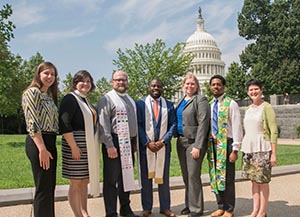

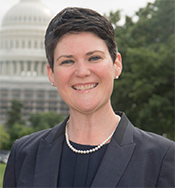

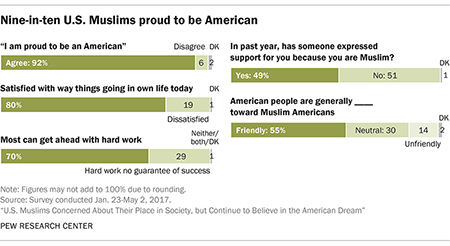 But even more Muslims—89 percent—say they are proud to be both American and Muslim. A significant majority also profess a continuing faith in the American dream.
But even more Muslims—89 percent—say they are proud to be both American and Muslim. A significant majority also profess a continuing faith in the American dream.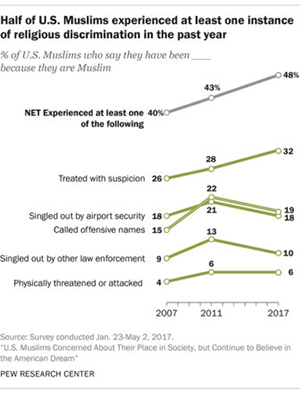 But even as Muslims have a growing sense of American support, they report increasing instances of religious discrimination in the past year—from being treated with suspicion to physical attacks. Almost half—48 percent—say that was their experience, compared to 43 percent in 2011 and 40 percent in 2007.
But even as Muslims have a growing sense of American support, they report increasing instances of religious discrimination in the past year—from being treated with suspicion to physical attacks. Almost half—48 percent—say that was their experience, compared to 43 percent in 2011 and 40 percent in 2007.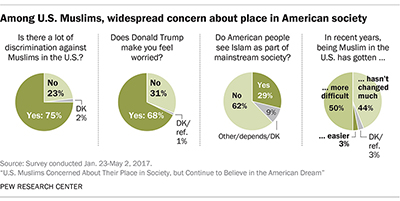 Overall, the majority of Muslims surveyed disapprove of Trump’s job performance, but President George W. Bush received similar levels of disapproval 10 years ago during his second term. While 65 percent of U.S. Muslims disapprove of Trump in the 2017 survey, 69 percent disapproved of Bush in 2007. In contrast, 14 percent disapproved of President Obama in 2011.
Overall, the majority of Muslims surveyed disapprove of Trump’s job performance, but President George W. Bush received similar levels of disapproval 10 years ago during his second term. While 65 percent of U.S. Muslims disapprove of Trump in the 2017 survey, 69 percent disapproved of Bush in 2007. In contrast, 14 percent disapproved of President Obama in 2011.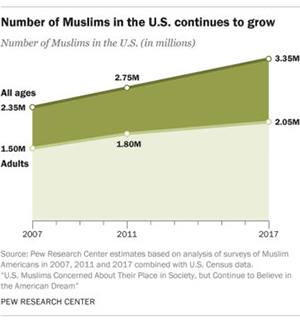 Researchers report a growing U.S. Muslim population—increasing from an estimated 2.35 million in 2007 to 3.35 million people of all ages today—with almost six in 10 born outside the U.S. The vast majority of Muslims living in the U.S. (82 percent) are American citizens.
Researchers report a growing U.S. Muslim population—increasing from an estimated 2.35 million in 2007 to 3.35 million people of all ages today—with almost six in 10 born outside the U.S. The vast majority of Muslims living in the U.S. (82 percent) are American citizens.